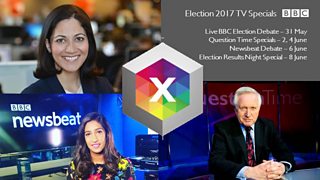主播大秀 announces plans for General Election 2017 special programmes
Jonathan Munro
Head of 主播大秀 Newsgathering

Ten years ago, the idea of televised election debates in this country was still a pipe dream. Then the 2010 election came along and the mould was shattered - Gordon Brown, Nick Clegg, and David Cameron took part in the 主播大秀's first TV debate. They’ve been a staple of campaigns ever since. In the referendum on Scotland’s independence. The election of 2015. And most recently during the EU referendum. More than 20 million people watched at least three minutes of one of the debate programmes on the 主播大秀 last June.
These TV moments give the public the chance to sit and listen to arguments put by all sides and to hear their questions answered – not, as is sometimes the case in the media, the trivia of the Westminster village.
That’s why we plan to do it all again this vote, as part of the most comprehensive package of election programming that will put you, the audience, at the heart of our coverage.
主播大秀 One will put on a live 主播大秀 Election Debate hosted by Mishal Husain on 31 May from Cambridge. It will feature seven podiums for leading figures from Conservative, Labour, LibDem, SNP, Plaid Cymru, Green Party and UKIP spokespeople to put their cases forward to the public.
As we know, the Prime Minister has said she will not participate in a televised leaders’ debate. That is her right. We won’t be embarrassing anybody into taking part – there’ll be no empty chair or vacant podium on any 主播大秀 programme. Ultimately it is for each party to say who will participate. We are inviting them to put up for the debate the person that they think will best make their party’s case. We do this because we think it is right to host debates that give people the chance to see how the major parties match up against each other.
Rest assured, we’ll be putting your tough questions to all the party leaders across a series of programmes during the campaign. That will include bringing Theresa May and Jeremy Corbyn in front of the same Question Time audience on the same night to be quizzed by the public.
We will scrutinise the Conservative and Labour leaders and we will do it in a way that asks the difficult questions, placing the audience and the choice at the heart of these primetime programmes. There will be two Question Time Specials, hosted by David Dimbleby, where the four main party leaders will face direct audience questions consecutively. Viewers in 2015 really connected with this format and the Question Time Special in Leeds was one of the most important and informative events of the 2015 General Election. So we are delighted to be putting it on air again.
We know our TV specials have helped galvanise people because the responses of the candidates can be compared and weighed up side-by-side, live. In all, we will put on more than ten hours of prime-time TV bringing the audience closer to what the big election choices are.
The 主播大秀 will be the place to come for expert coverage of that choice, not forecasting the race. In our programmes we will ask about the important public policies airing them to a large audience – they won't simply be a platform to repeat the slogans of political campaigning.
After all, this is a contest about the choices the next Government is going to make over the coming five years. We will examine what the most difficult and consequential issues are likely to be through our reporting, interviewing and by giving the public a platform to ask those questions of politicians, or to hear them asked on their behalf.
Multi-millions of voters watched the TV moments in the 2010 and 2015 General Elections, and we know that they were seen by audiences who don’t traditionally tune in to mainstream news programmes.
The Wembley Arena debate during last year’s EU Referendum was watched by nearly 700,000 young people. And the democratic process itself benefitted from that, with turnout in younger age groups higher in those elections with debates than recent campaigns without. And, at the last election three quarters of the Newsbeat debate audience said it helped them understand the issues better. Our final debate will be a Newsbeat one on Radio 1 and 主播大秀 One on 6 June.
As a Public Service Broadcaster, we count that as a success. We can see we have helped inform, one of the underlying principles for why the 主播大秀 exists. Our promise to the public during this election campaign is to give them reliable impartial news and a place where they can get beyond the noise to better understand the issues at stake.
The 主播大秀 will play to its strengths. Audience engagement. Accuracy. Impartiality. Expertise. It will be the home for real news and insight. It is why one of the things I’m especially excited about is the new Reality Check slot on the Sunday night News at Ten bulletin. Steph McGovern will be examining whether the big claims stand up to scrutiny.
There is no more important time to engage with the people of this country than now. When they want to hear from the politicians vying to lead the country. That is good for public service TV. That is good for democracy. That is firmly in the public interest.
Jonathan Munro, Head of 主播大秀 Newsgathering
